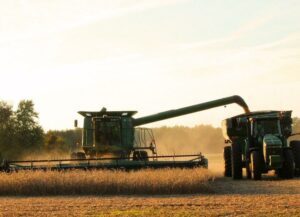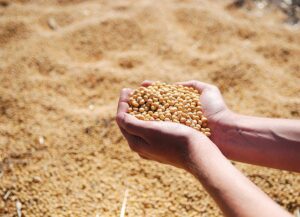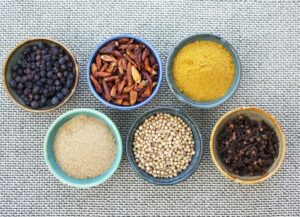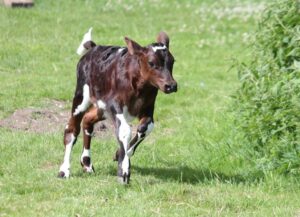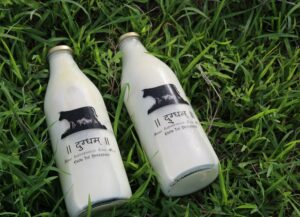Alvaro Garcia
Young heifer calves represent the future of a dairy farm and need to be fed so they can express their full genetic potential during their productive life. Many challenges can impair their optimal development such as management flaws, disease, and sub-optimal nutrition. Despite the farmer’s efforts some of these stressors may show-up and compromise their well-being, negatively impacting their development.
Vitamin deficiencies for example (i.e. vitamin E), affect their ability to cope with oxidative stress and hamper the development of their acquired immunity. Taking adequate measures to reduce stress spares natural antioxidants needed for other important body functions. Some feeds possess antinutritional factors, and when included in the ration can further challenge normal metabolism.
Cottonseed meal is a traditional feedstuff commonly used in mature dairy cows. Its competitive price compared to other meals of plant origin makes it an attractive feedstuff. It is however a relatively poor source of the amino acids lysine and methionine, and contains gossypol, a phenolic aldehyde that permeates cells and inhibits several dehydrogenase enzymes.
In adult lactating cows its inclusion, however, has resulted in milk production performance like canola or soybean meal. Its use on neonatal calves without a fully developed rumen is contraindicated since at this age calves’ function as a simple-stomached animal, without the beneficial detoxifying properties of the rumen. This problem has been addressed in recent research by using enzymatic or microbial hydrolysis.
What are bioactive peptides?
This process transforms cottonseed proteins into more easily digested peptides and denatures its anti-nutritional factors. In non-ruminant animal experiments, dietary peptides have improved in palatability, growth, feed efficiency, and health. The inclusion of a soy protein isolate hydrolysate (19.7% DM) in a calves’ starter showed similar performance compared to control calves fed skim milk powder; this indicated an increased protein availability and the inactivation of anti-nutritional factors.
One advantage of these peptides is that their antioxidant, antihypertensive, and immuno-modulatory properties beyond their traditional nutritional importance, which have granted them the name of “bioactive peptides”.
Neutrase-liberated peptides from cottonseed protein has apparently showed strong antioxidant activity that gives this meal properties that exceed its nutritive value. Replacement of soybean meal with fermented cottonseed meal (rich in small size peptides) resulted in broilers in improved nutritional, growth performance, serum immunoglobulin, and oxidative status.
A recent experiment (B. Dolatkhah et al. 2020) was conducted to precisely evaluate the effects of feeding neonatal calves enzymatic hydrolyzed cottonseed protein rich in bioactive peptides and assess its effects as a nutritional and functional additive. The parameters measured were related to performance, metabolic parameters, ruminal nitrogen metabolism, and rumen development of neonatal dairy calves.
Holstein calves weighing 40.4 ± 2.13 kg were separated from their dams at birth and placed in individual pens bedded with wood shavings. Calves received 4 L of colostrum within 3 h of birth, and then fed transition milk twice a day. Blood samples were drawn 24 hours after colostrum intake and serum total protein measured with a digital refractometer to assess passive immunity transfer.
Only calves with a serum protein level above 5.8 g/dL were included in this study. Calves were then bucket-fed pasteurized waste milk (11.5% DM, 2.8% protein, and 3.2% fat) twice daily from 0 to 50 days of age, followed by once daily from 51 to 56 days. There was an adjusted step-up/step-down milk feeding protocol as 5, 6, 5, and 3 L for weeks 1-2, 3-4, 5-7, and 8, respectively. Weaning was at day 56 with the experiment ending on day 70.
Calves were blocked by sex and randomly assigned to 1 of 4 calf starters as follows:
- Cottonseed protein = 0% inclusion
- Cottonseed protein = 2% inclusion
- Cottonseed protein = 4% inclusion
- Cottonseed protein = 6% inclusion
Crude protein and crude fiber contents of cottonseed meal were 45 and 8%, respectively. Cottonseed protein hydrolysates were categorized into 4 fractions according to their molecular weights, less than 1,000, 1,000–2,000, 2,000–5,000 and more than 5,000 Daltons by 48.9, 21.1, 17.5, and 12.5% of total peptides, respectively. Diets were isonitrogenous and isocaloric and met NRC 2001 requirements. Other feeds were steam-flaked corn and chopped alfalfa hay (7%).
Supplementing cottonseed meal in the starter impaired calf growth and ruminal and intestinal development
Increased concentrations of cottonseed meal decreased starter intake during the postweaning (d 57 to 70) and overall periods (d 1 to 70). Average daily gains tended to linearly decrease as cottonseed meal increased in the starter. Results of this study also showed that adding 2% of cottonseed meal improved the antioxidant capacity of calves but did not enhance rumen development.
Supplementing 6% cottonseed meal in the starter impaired growth and ruminal and intestinal development, while inducing increased stress as evidenced by higher cortisol concentrations. Calves supplemented with 6% cottonseed meal had lower empty reticulo-rumen and omasum weights and rumen wall thickness compared to all other treatments at the end of the study.
The effects of the antioxidant were quadratic, with calves fed 2 and 4% cottonseed meal having the highest total antioxidant capacity, whereas those fed 0 and 6% HCSP having the lowest antioxidant capacity both at weaning and at end of the study. Serum cortisol concentration was higher in calves supplemented with 6% of cottonseed meal which suggests they were experiencing stress.
It appeared that pre-weaned calves in this experiment did not benefit from cottonseed meal in the starter.
Reference
B Dolatkhah, G R Ghorbani, M Alikhani, F Hashemzadeh, A H Mahdavi, A Sadeghi-Sefidmazgi, H Erfani, P Rezamand. Effects of hydrolyzed cottonseed protein supplementation on performance, blood metabolites, gastrointestinal development, and intestinal microbial colonization in neonatal calves. J Dairy Sci. 2020 Jun;103(6):5102-5117.
© 2020 Dairy Knowledge Center. All Rights Reserved.


